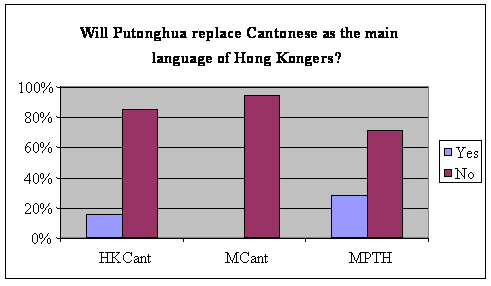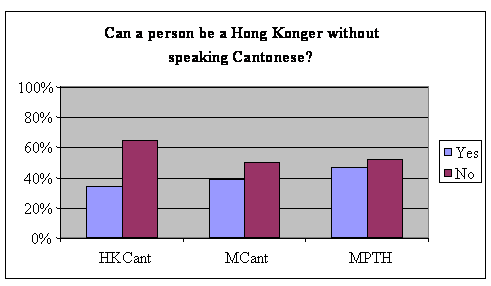The latest new release from Sino-Platonic Papers is one that I think will be of particular interest to readers of Pinyin News. It’s an extensive study of not only the attitudes of speakers of Cantonese and Mandarin toward the status of Cantonese but also their beliefs about its future, especially in Hong Kong: Language or Dialect–or Topolect? A Comparison of the Attitudes of Hong Kongers and Mainland Chinese towards the Status of Cantonese (650 KB PDF), by Julie M. Groves.
This study reports on a comparative survey of three groups of Chinese: 53 Hong Kong Cantonese speakers, 18 Mainland Chinese Cantonese speakers, and 72 Mainland Chinese Putonghua speakers. It was found that the Putonghua speakers held more ‘classic’ views, the majority seeing Cantonese as a dialect. In contrast, only just over half the Hong Kongers and two-fifths the Mainland Cantonese speakers considered it clearly a dialect, while one-third of all respondents favoured a mid-point classification. The differing perspectives held by the groups can be traced to their different political and linguistic situations, which touch issues of identity.
The author notes, “The uncertainties in classification also reflect a problem with terminology. The Chinese word usually translated dialect, fangyan (方言), does not accurately match the English word dialect.” Groves recommends the adoption of Victor Mair’s proposed English word for fangyan: topolect.
Although this focuses on the dialect vs. language debate, it covers much more than that. Those being surveyed were also asked questions such as:
- Where do you think the best Cantonese is spoken?
- Do you think Putonghua will eventually replace Cantonese as the main, everyday language of Hong Kongers?
- Do you think it is possible for someone to consider themselves to be a Hong Konger (or Hong Kong Chinese/Chinese Hong Konger) without being able to speak Cantonese?
The results of the study may also prove useful for those interested in the future of other languages of China and Taiwan, such as Taiwanese and Shanghainese.
Here are a couple of the many graphs found in the study.
HK Cant = Hong Kong Cantonese speakers
MCant = mainland Cantonese speakers
MPTH = mainland speakers of Mandarin (“Pǔtōnghuà“)



Isn’t that very few people to base a survey on?
Also, I think limiting the corpus of survey subjects to just HK and Guangdong is severely limiting. There are a lot of Cantonese speakers in Malaysia [and, to a certain extent, despite the purges, in Indonesia], and they represent a subculture of Cantonese [different accent, different culture, …].
Thanks for the link and summary Mark.
I read the paper with great interest. I agree with J B that the survey is, unfortunately, based on a very small number of respondents. All the more disappointed seeing the excellent literature review done by the author.
But then again, similar research has hardly been done in Hong Kong and as you stated, such survey can be of interest to other researchers. Whether the terminological difference between “dialect” and “topolect” (the paper’s topic) will be of interest to either researchers or public is doubtful. Probably to the former as a mere ‘academic’ matter. To the public it might be like providing a better-looking coat to something not looking to attractive in the first place.
Also, to discuss how respondents viewed the difference between a “dialect” and “language” without making sure the terms were presented correctly in the survey (which was English-only, thus using the pejorative word “dialect”) is unfortunate.
Still, to anyone with an interest in any of the so-called “dialects” in China and Taiwan, this paper offers an excellent background of Hong Kong’s language situation with some of the most relevant questions vis-a-vis the future of Cantonese.
Pingback: Attitudes in Hong Kong toward Mandarin and Cantonese | Pinyin News
For the question “Do you think Putonghua will eventually replace Cantonese as the main, everyday language of Hong Kongers?”, it’s interesting to see that some 18% HKCant responded with a Yes, while none of the MCant thought so. Not sure how that was the case.
“53 Hong Kong Cantonese speakers, 18 Mainland Chinese Cantonese speakers, and 72 Mainland Chinese Putonghua speakers.” This is indeed a small sample size.
I noticed this survey was done about 10 years ago. The political / cultural / language atmosphere had changed a lot in HK, Mainland China, as does the relationship between the two communities. If you take a similar survey on this question (on a large size of sample of course), I am quite sure you will receive a totally different result.
BTW, I am from Mainland China and can speak both Mandarin and Cantonese.